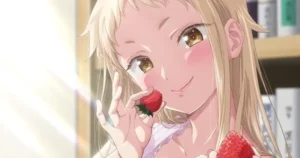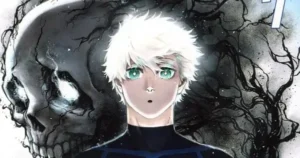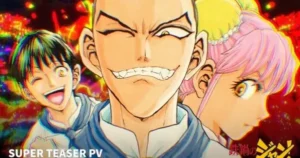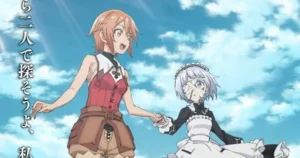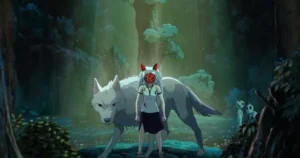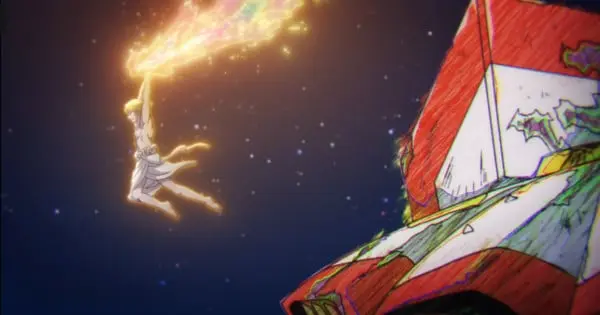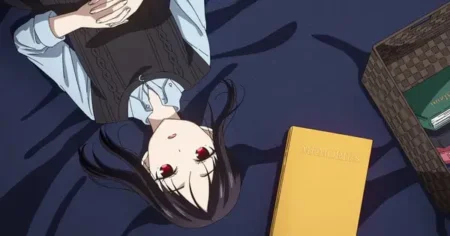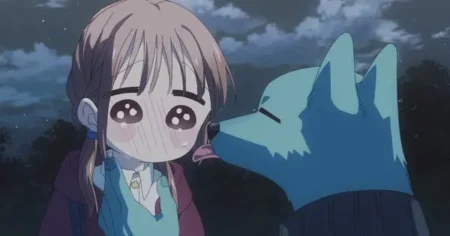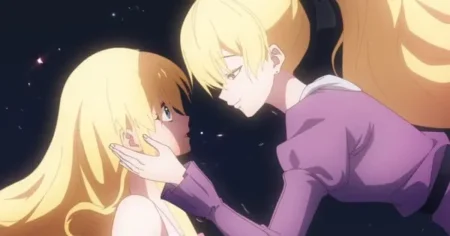Episodes 8 and 9 of ZENSHU delve into the complexities of love, sacrifice, and the difficult choices Natsuko faces as she tries to alter the tragic fate of “A Tale of Perishing.” The series, produced by MAPPA, continues to explore the themes of artistic integrity and the power of creation, directed by Mitsue Yamazaki and written by Kimiko Ueno.
Episode 8: Confession and Confrontation
Tsuruyama’s Taunts and Artistic Integrity
Episode 8 opens with Natsuko being confronted by a mysterious, bird-like creature who reveals herself to be Kametaro Tsuruyama, the original director of “A Tale of Perishing”. Tsuruyama expresses her disapproval of Natsuko’s “fan edits,” sparking a debate about artistic integrity and how much ownership a creator can claim once a piece of art is released into the world. Tsuruyama insists that the ending is set in stone and that Natsuko’s interventions are merely adding runtime. This leaves Natsuko questioning her actions and whether she is truly helping or hindering the story.
Tsuruyama’s argument touches on a long-standing debate:
- Creator’s Rights: Some artists believe in maintaining strict control over their creations, even opposing transformative fandom works like fanfiction.
- Fan Interpretation: Others, like Natsuko, see fan creations as an act of deep love and further exploration of the characters and world.
Luke’s Confession and Nasuko’s First Love
The episode shifts focus to Luke, who struggles with his growing feelings for Natsuko. Encouraged by the bartender, he decides to confess his love, leading to awkward but sweet moments between him and Natsuko. These moments culminate in a hot springs scene created by Ganger, one of the Nine Soldiers, adding a layer of meaning beyond simple fanservice. The fight against a new Void underscores the evolving threat they pose. As the explosion from the Void’s destruction sends Luke and Natsuko flying, she realizes her true feelings for him, experiencing “first love” at last.
Episode 9: Hero and Heartbreak
Luke’s Perspective and a Looming Tragedy
Episode 9 starts with a recap from Luke’s point of view, highlighting how meeting Natsuko changed his life. This emphasizes the growing bond between them, even as a sense of foreboding looms.
QJ’s Sacrifice
The heroes face off against the Voids, and in a heartbreaking turn of events, QJ sacrifices himself to protect everyone. This act underscores the unforgiving nature of the world Natsuko is trying to change. One particular review highlights the emotional impact of this loss, noting that QJ’s “canonical birthday is March third,” adding a painful layer to his sacrifice.
Natsuko’s Doubt and the Inevitable Ending
Kametaro’s words continue to haunt Natsuko. She struggles with the idea that she cannot change the ending and that Luke is destined to die. This internal conflict is portrayed through excellent facial expressions and voice acting, capturing Natsuko’s panic and desperation. The episode emphasizes the tragic conclusion of the movie’s narrative, leaving Natsuko to reflect on her decisions.
The Void’s Evolution and a Glimmer of Hope
The Voids continue to evolve, even copying the abilities of Natsuko’s animations, suggesting they are becoming a more significant threat. Despite the grim circumstances, the episode highlights the strong teamwork between Luke and Natsuko, offering a glimmer of hope amidst the despair.
Themes and Analysis
Fate vs. Free Will
The central conflict in episodes 8 and 9 revolves around the struggle against preordained fate. Natsuko’s attempts to alter the story of “A Tale of Perishing” are constantly challenged by Tsuruyama’s assertion that the ending is “written in stone.” This raises questions about whether Natsuko can truly change the story or if she is simply delaying the inevitable.
The Power of Love and Connection
Despite the looming tragedy, the episodes emphasize the power of love and connection. Luke’s confession and Natsuko’s realization of her feelings for him provide a source of hope and motivation. The bonds between the characters, particularly within the Nine Soldiers, are tested but ultimately strengthened in the face of adversity.
Artistic Ownership and Fandom
The debate between Natsuko and Tsuruyama highlights the complex relationship between creators and their audience. While some creators may feel possessive of their work, others embrace fan interpretations and transformative works as a form of appreciation. ZENSHU seems to advocate for the latter, suggesting that art can evolve and take on new meanings through the engagement of its audience.
Conclusion
Episodes 8 and 9 of ZENSHU deliver a powerful emotional punch, exploring themes of love, sacrifice, and the struggle against fate. As Natsuko grapples with her feelings for Luke and the seemingly inevitable tragedy of “A Tale of Perishing,” the series raises thought-provoking questions about artistic integrity and the power of creation. With the stakes higher than ever, the remaining episodes promise to be a compelling conclusion to Natsuko’s journey.

